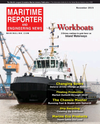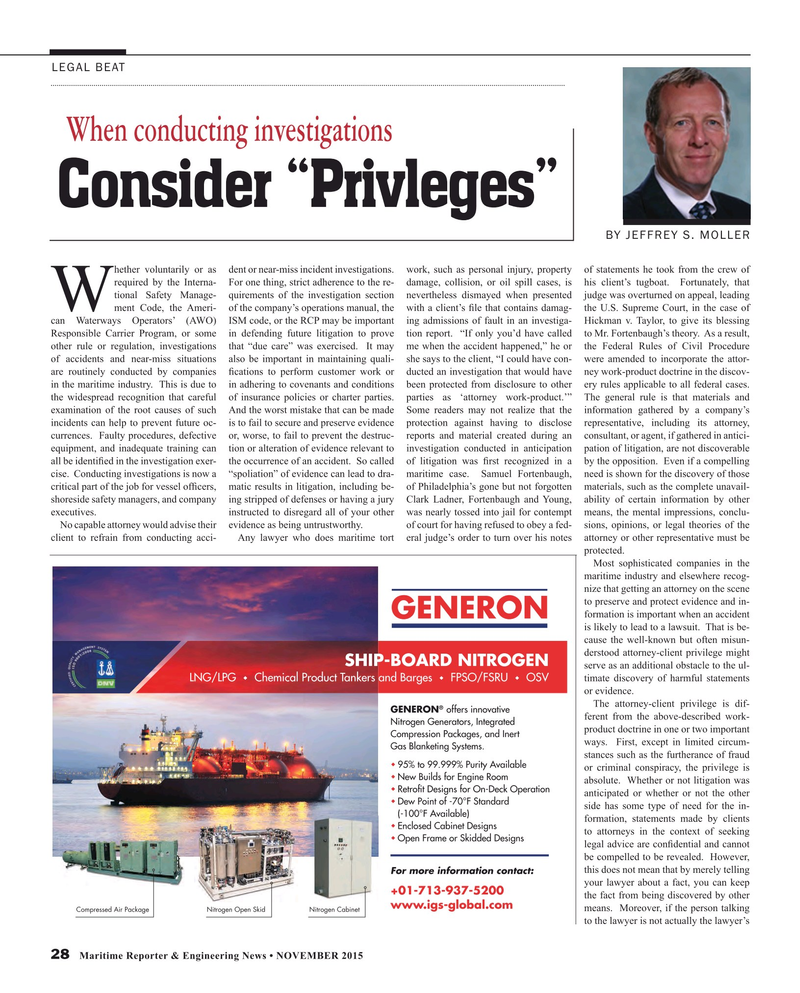
Page 28: of Maritime Reporter Magazine (November 2015)
Workboat Edition
Read this page in Pdf, Flash or Html5 edition of November 2015 Maritime Reporter Magazine
LEGAL BEAT
When conducting investigations
Consider “Privleges”
BY JEFFREY S. MOLLER hether voluntarily or as dent or near-miss incident investigations. work, such as personal injury, property of statements he took from the crew of required by the Interna- For one thing, strict adherence to the re- damage, collision, or oil spill cases, is his client’s tugboat. Fortunately, that tional Safety Manage- quirements of the investigation section nevertheless dismayed when presented judge was overturned on appeal, leading
Wment Code, the Ameri- of the company’s operations manual, the with a client’s ? le that contains damag- the U.S. Supreme Court, in the case of can Waterways Operators’ (AWO) ISM code, or the RCP may be important ing admissions of fault in an investiga- Hickman v. Taylor, to give its blessing
Responsible Carrier Program, or some in defending future litigation to prove tion report. “If only you’d have called to Mr. Fortenbaugh’s theory. As a result, other rule or regulation, investigations that “due care” was exercised. It may me when the accident happened,” he or the Federal Rules of Civil Procedure of accidents and near-miss situations also be important in maintaining quali- she says to the client, “I could have con- were amended to incorporate the attor- are routinely conducted by companies ? cations to perform customer work or ducted an investigation that would have ney work-product doctrine in the discov- in the maritime industry. This is due to in adhering to covenants and conditions been protected from disclosure to other ery rules applicable to all federal cases. the widespread recognition that careful of insurance policies or charter parties. parties as ‘attorney work-product.’” The general rule is that materials and examination of the root causes of such And the worst mistake that can be made Some readers may not realize that the information gathered by a company’s incidents can help to prevent future oc- is to fail to secure and preserve evidence protection against having to disclose representative, including its attorney, currences. Faulty procedures, defective or, worse, to fail to prevent the destruc- reports and material created during an consultant, or agent, if gathered in antici- equipment, and inadequate training can tion or alteration of evidence relevant to investigation conducted in anticipation pation of litigation, are not discoverable all be identi? ed in the investigation exer- the occurrence of an accident. So called of litigation was ? rst recognized in a by the opposition. Even if a compelling cise. Conducting investigations is now a “spoliation” of evidence can lead to dra- maritime case. Samuel Fortenbaugh, need is shown for the discovery of those critical part of the job for vessel of? cers, matic results in litigation, including be- of Philadelphia’s gone but not forgotten materials, such as the complete unavail- shoreside safety managers, and company ing stripped of defenses or having a jury Clark Ladner, Fortenbaugh and Young, ability of certain information by other executives. instructed to disregard all of your other was nearly tossed into jail for contempt means, the mental impressions, conclu-
No capable attorney would advise their evidence as being untrustworthy. of court for having refused to obey a fed- sions, opinions, or legal theories of the client to refrain from conducting acci- Any lawyer who does maritime tort eral judge’s order to turn over his notes attorney or other representative must be protected.
Most sophisticated companies in the maritime industry and elsewhere recog- nize that getting an attorney on the scene to preserve and protect evidence and in- formation is important when an accident is likely to lead to a lawsuit. That is be- cause the well-known but often misun- derstood attorney-client privilege might
SHIP-BOARD NITROGEN serve as an additional obstacle to the ul- timate discovery of harmful statements
LNG/LPG Chemical Product Tankers and Barges FPSO/FSRU OSV? ? ?
or evidence.
The attorney-client privilege is dif- ®
GENERON offers innovative ferent from the above-described work-
Nitrogen Generators, Integrated product doctrine in one or two important
Compression Packages, and Inert ways. First, except in limited circum-
Gas Blanketing Systems.
stances such as the furtherance of fraud ? 95% to 99.999% Purity Available or criminal conspiracy, the privilege is ? New Builds for Engine Room absolute. Whether or not litigation was ? Retro?t Designs for On-Deck Operation anticipated or whether or not the other ? Dew Point of -70°F Standard side has some type of need for the in- (-100°F Available) formation, statements made by clients ? Enclosed Cabinet Designs to attorneys in the context of seeking ? Open Frame or Skidded Designs legal advice are con? dential and cannot be compelled to be revealed. However, this does not mean that by merely telling
For more information contact: your lawyer about a fact, you can keep +01-713-937-5200 the fact from being discovered by other www.igs-global.com means. Moreover, if the person talking
Nitrogen Open Skid Compressed Air Package Nitrogen Cabinet to the lawyer is not actually the lawyer’s 28 Maritime Reporter & Engineering News • NOVEMBER 2015
MR #11 (26-33).indd 28 11/5/2015 9:36:40 AM

 27
27

 29
29
